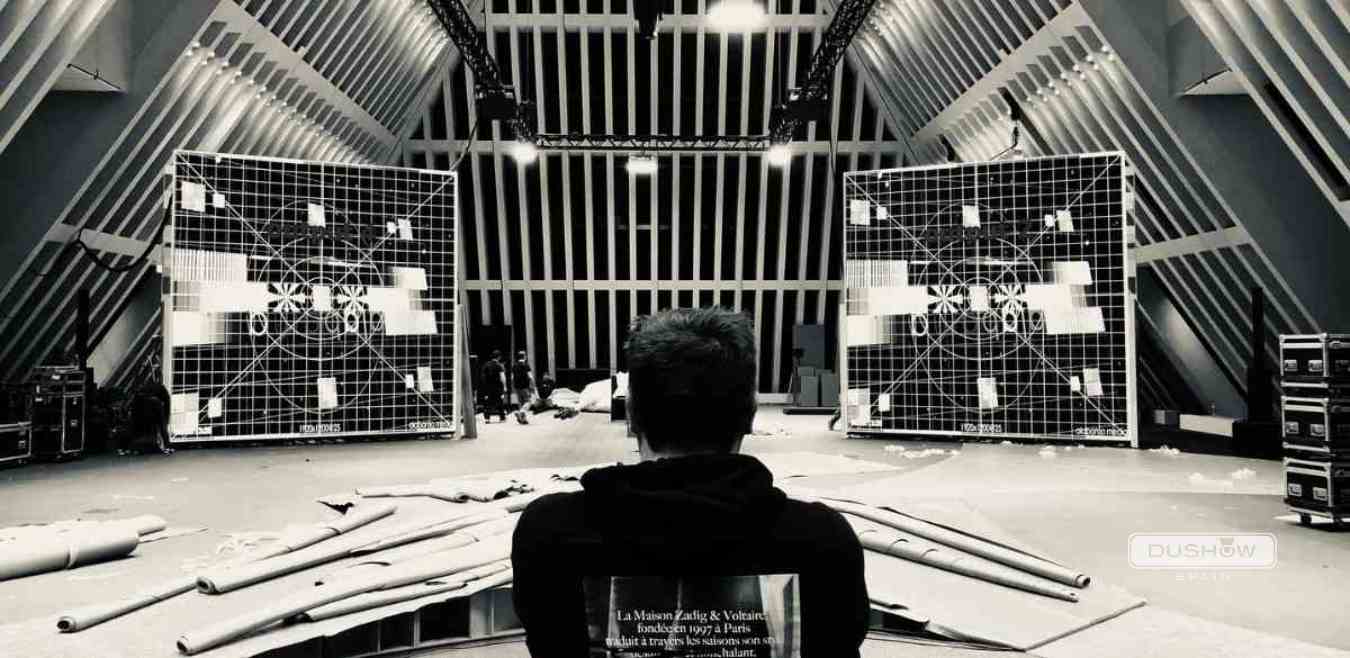Dushow Spain is now Novelty Spain
what is virtual event Production and Who DRIVES it?
In the realm of business evolution, virtual events production have emerged as a beacon of communication and engagement. But what truly lies beneath the surface of virtual event production?
Join us on an exploration to uncover the secrets of virtual event production, as we unveil the key players who craft these digital experiences. Get ready to dive into the heart of innovation!
Unveiling Virtual Event Production
Virtual events unfold in a digital realm, hosted either online or in a entire virtual environment, and are delivered through streaming. As a result, attendees may not physically gather at a specific location but instead participate from anywhere globally, provided they have an internet-connected device.
Virtual events serve as the solution to sustain communication and engagement with a globale audience. These events enable markets to continue hosting events and disseminating messages, all from the comfort of one's home, office or any other place.
Some advantages of virtual events:
- Wider Reach: The ability to reach a broader audience, expanding your potential customer base.
- Increased Profitability: A more cost-effective approach.
- Original Experiences: The creation of unique and innovative experiences.
- Elimination of Travel: Eliminating the need for attendees to travel to event locations.
- Flexible Timing: Attendees can participate without blocking large time periods.
- Enhanced Interactivity: Technology enables high levels of audience interaction
We must be aware that merely holding a digital meeting through Meet, Zoom or Microsoft Teams does not make it a virtual event. But there are other intrinsic traits of an event that can carry over into virtual event production.
8 key considerations for virtual event production
-
Structured Sessions: Establishing opening and closing sessions provides a cohesive framework for your virtual event. These sessions bookend the event, setting the tone and facilitating attendee engagement.
-
Clear Objectives: Define the event's objectives, whether for education, entertainment, networking, or lead generation. A well-defined purpose shapes content, format, and expected outcomes, aiding communication with attendees.
-
Platform Selection: Choosing the right virtual event platform and time for your event is crucial for smooth execution and maximum engagement. Consider features, functionalities, time zones, and attendee availability.
-
Effective Promotion: Ensure attendees know when and how to participate in your event.
-
Comprehensive Script and Agenda: A well-structured script and agenda maintain information flow and attendee engagement. Clear scripts help presenters, and agendas provide event structure.
-
Dynamic Visual Elements: Incorporate visually engaging graphics, videos, and animations to enhance presentations and capture audience attention.
-
Audience Interaction Tools: Utilize interactive tools like live polls, Q&A sessions, chat functions, and virtual breakout rooms to foster real-time engagement.
-
Post-Event Analysis: Evaluate the event with your team to identify successes and areas for improvement.
The Role of Technical Production in Virtual Events
Technical production at events entails meticulous planning, coordination, and execution of all details, regardless of size, to create a unique and unforgettable event experience for customers and audiences. Poor video production can also frustrate event sponsors who have invested in its success.
6 key points of technical production in virtual event production
- Technical production directly impacts the attendee experience. It’s something much more powerful than words, because it appeals to people’s emotions and feelings.
- Audio and Video Quality is crucial for a successful virtual event. This includes using professional-grade microphones, cameras, and lighting equipment to capture clear and crisp audio and visuals.
- Choosing the right streaming platform or software is key to delivering a seamless viewing experience. It should have the capacity to handle the anticipated number of attendees and provide features like adaptive streaming to optimize video quality.
- Virtual Set Design and Graphics it's a key for engaging and visually appealing virtual set design adds to the overall production value. This involves utilizing green screens, virtual backgrounds, and augmented reality (AR) elements.
- Technical Support and Backup should be readily available to troubleshoot any technical issues that arise, such as audio or video glitches, platform-related problems, or participant connectivity issues.
- Recording and Post-Production: enables future use, such as on-demand viewing or creating promotional content. It is essential to capture both the main content and any interactive elements. Post-production editing can help enhance the final product by refining audio and video quality, incorporating additional graphics or effects, and creating highlight reels or recap videos for promotional purposes.
Who Are the Key Players in Virtual Event Production?
Main roles of Production Engineers
Production engineers serve as the creative and technological coordinators responsible for conveying the event´s atmosphere and emotions through sound, light, video and design.
That task requires highly specialized profiles:
- Head of Production: This person is responsible for interpreting the customer’s needs and goals, and coordinating all of the departments to ensure the event objectives are achieved at the production level.
- Project Manager: Once the event has been defined at the production level, the project manager will be responsible for everything being flawlessly carried out. This “field role” will become the contact liaison for the customer, helping them resolve the different situations that could arise.
- Crew chief: At an event, there are a number of individuals responsible for its set-up and teardown. The crew chief’s role is to ensure that each of them knows exactly what they are supposed to do.
- Show Caller: Any event involving planning requires a “show caller”, the stage director responsible for the planned order, movements and effects.
Video crew
Having defined the roles of production engineers that have a hand in the overall production, we come to more specific positions, such as the video crew:
- Graphics Operator: A video engineer responsible for the visual content that will be added to the broadcast, such as PTT, background, lower thirds (subtitles), videos, etc. Don’t worry if the names sound exotic; these technicians know exactly what they are about.
- Spyder Operator: the Spyder is just one piece out of all the stunning array of equipment necessary to produce an event. And of course, it requires a dedicated video engineer.
- Projector Tech: the projector tech is the video technician responsible for the projection. They have the task of adjusting the projectors to the screen andcre ensuring they operate properly throughout the event.
- LED Screen Tech: Video technician who adjusts the LED screen/s for optimum display and viewing. As issues can arise during an event, the person in this post is permanently on duty for the duration.
- Video Tech: A video technician responsible for setting up and taking down video equipment, as well as seeing to it that it all works properly.
- Camera Director: Person in charge of coordinating the different cameras and deciding the shots and angles most relevant for each moment. As opposed to a face-to-face event, the person in this post is 100% responsible for what the audience sees through streaming.
- Cameras: Video staff members in charge of handling the cameras.
- CCU Operator: Production engineer responsible for standardizing the picture settings of the different cameras. They work hand in hand with the lighting operator to adjust the necessary light to optimal levels.
- Call Centre Operator: As it is an event broadcast by streaming, you’ll need the support of a platform to make it possible (Skype, TX, Zoom, etc.). The role of this technician is to work through these platforms to connect the registered attendees to the event.
Sound crew
When producing an event, sound is important and sensitive in equal measure. That’s why there are production technicians devoted to different sound tasks.
- Sound Operator: Sound technician responsible for mixing the audio, for those who are physically on-site as well as those on the receiving end of the streaming.
- RF System / Com tech: This person oversees the wireless microphones, in addition to intercommunication among technicians, production and other staff members involved in the event.
- Sound tech: This technician is in charge of setting up and taking down the sound equipment and guaranteeing that it all works according to spec.
Lighting crew
Lighting plays a major role in an event, directing audience attention and emotions in synch with the video. That’s why there are true specialists in the field.
- Lighting Operator: Lighting technician responsible for managing the light table, and guaranteeing the event is properly lit, for those on the set as well as the final image sent via streaming.
- Lighting tech: This is the professional responsible for the technical set-up and take-down of all lighting equipment, and its proper operation. They report to the Crew Chief.
If you want to know more about event lighting, you can watch the following video from our channel:
Now that you've uncovered the incredible world of virtual event production and met the ingenious minds behind it, it's time to turn your vision into reality. Don't let your next event be ordinary when it can be extraordinary.
Let's embark on this journey together. Reach out to us now, and let's start crafting your extraordinary virtual event. The spotlight is waiting for you!






